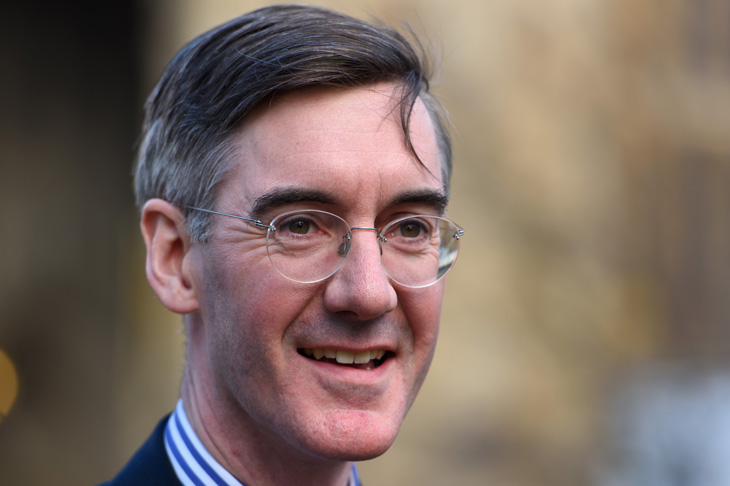‘We need to talk about why the internet is falling in love with Jacob Rees-Mogg, because it’s not OK,’ warns a recent post on the Corbynista website The Canary. Its anxiety is not misplaced. Polite, eloquent, witty, well-informed, coherent, principled — Jacob Rees-Mogg is the antithesis of almost every-thing the Labour party stands for under its current populist leadership. And far from putting off voters, it seems to be a winning formula. Even sections of the elusive and generally very left-wing youth vote appear to be warming to the idea that our next prime minister shouldn’t be (alleged) man-of-the-people Corbyn but yet another plummy, Old Etonian millionaire…
This ought to make no sense at all. If there’s one lesson the Conservative party’s strategists have learned from Jeremy Corbyn’s performance in the polls — at the time of writing he has an eight-point lead — it’s that Britain has had enough of conservatism. Actually, the word they use is ‘austerity’ but it amounts to the same thing. So widespread is the panic in the party that even its more fiscally responsible luminaries are coming round to the idea that, from university tuition to the NHS, the only way to beat Corbyn is to talk and spend like socialists.
But not The Mogg. He made his position perfectly clear (as he always does) in a response to a potentially tricky question last week on BBC Question Time. ‘Does the panel agree with David Cameron that it is selfish to give the public sector a pay rise?’ This would have stumped most Tory politicians, preying as it does on their greatest fear, that someone some day might catch them out saying something that sounds uncaring.
The Mogg, however, did not flinch. Patiently, lucidly, authoritatively he set out the terms of the issue: in 2010, the Tories had inherited from Labour a £150 billion deficit, which meant that they had no choice but to make decisions which were ‘difficult and unpopular’. There are, he went on to explain, only three ways of funding such a pay increase: to raise taxes, to borrow more or to reallocate from the current budget.
At which point you might have expected the audience’s eyes to be glazing over. Not a bit of it. Judging by their applause and cheers they were elated that, perhaps for the first time in Question Time’s recent history, a politician on the panel was prepared to talk to them straight, credit them with a degree of intelligence, and forebear from the usual virtue-signalling platitudes.
During and after the programme the internet went mad for The Mogg. What had surely been conceived as a trap — the almost comically old-fashioned Tory MP from rural Somerset appearing with four left-leaning Remainers on a panel before the doughty burghers of Burton on Trent, a day after the birth of his sixth child Sixtus Dominic Boniface Christopher — instead turned into yet another triumph for the outsider whose rise now looks as unstoppable as that of his ideological antithesis Jeremy Corbyn.
In the last few weeks, the odds on Jacob Rees-Mogg becoming the next Conservative leader have been slashed from 50 to 1 to 10 to 1 — putting him ahead of Ruth Davidson, Sajid Javid and Michael Gove. And while it’s true that in the upper echelons of the party they’re still talking of it as a big beasts’ battle between David Davis, Philip Hammond, Boris Johnson and Amber Rudd, out among the Tory grassroots there is a great deal more appetite for the one candidate on offer who still thinks and talks like an actual conservative.
I’d vote for him like a shot. And what I find encouraging is that the main, all-too-predictable charge being laid against him by his critics — that he’s too posh — just isn’t having much effect. These comments from social media give you a flavour: ‘Poshness no barrier to working class affection. Being humble, unaffected & sincere goes down well’; ‘I’m working class & this is so true for me #just saying’; ‘Mr Rees-Mogg the phone directory, his voice is sublime’; ‘The current rabble give me no hope… I want to feel we’re in good hands & I get that with JRM.’
Rees-Mogg’s appeal to old-school Tories is obvious. He believes unashamedly in the kind of honest-to-goodness conservatism — minimal state interference, free enterprise, personal liberty within a framework of tradition, self-discipline and family values, low taxes — that the party’s upper echelons have scarcely dared advocate since the Thatcher era. His no-nonsense attitude to the EU goes down well with Ukippers too. ‘You are either in the European Union or you leave it,’ he said on Question Time, wearing the pained expression of a man pointing out something so agonisingly obvious that he’s amazed even his thicko fellow panellists can’t get it. It won him whoops of delight from the audience.
What’s more surprising, perhaps, is the extent of his appeal among those teens and millennials who might be expected to prefer Corbyn. Yes, it’s probably true that as with Boris, they find him so funny and charming they’re prepared to overlook the fact that he belongs to the hated Tories. But what I think they warm to even more is his extraordinary authenticity.
In youth parlance, Rees-Mogg is ‘based’. He’s quick on his feet, comfortable in his skin, knows his own mind and is beholden to no man. Having made his fortune as a value investor in emerging markets before becoming an MP, he is in the unusual position of being able to say what exactly he thinks — and from a position of knowledge and experience. He’s also funny, self-deprecating, charming, looks great in a bespoke double-breasted suit and even better in the copious memes on social media celebrating his wit, wisdom and magnificence. Moggmentum, that’s what they’re calling it. If there’s any justice, it will take him all the way…







Comments